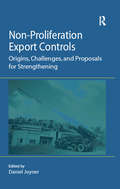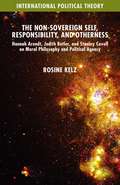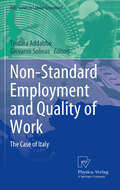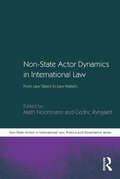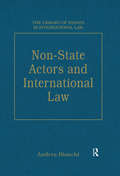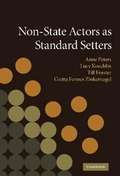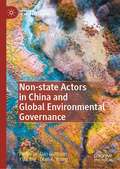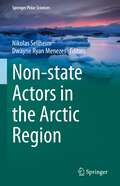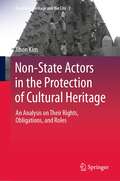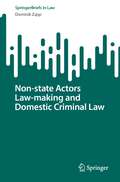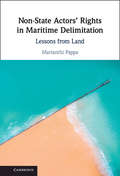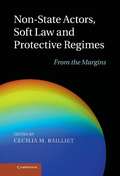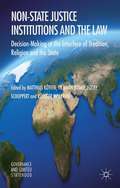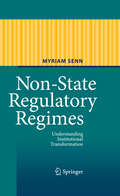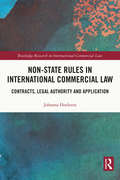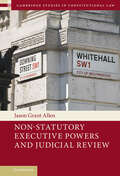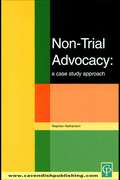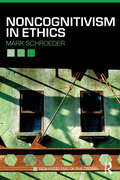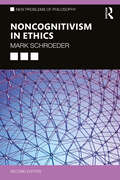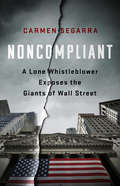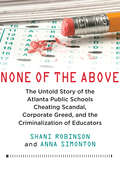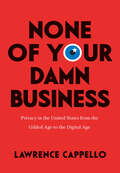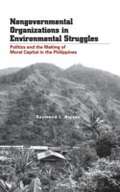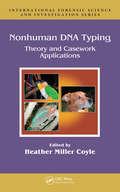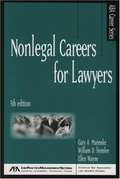- Table View
- List View
Non-Proliferation Export Controls: Origins, Challenges, and Proposals for Strengthening
by Daniel JoynerThis volume provides a comprehensive and interdisciplinary examination of the Multilateral Non-Proliferation Export Control system and the national and international context within which it functions. Key features: "
The Non-Sovereign Self, Responsibility, and Otherness: Hannah Arendt, Judith Butler, and Stanley Cavell on Moral Philosophy and Political Agency (International Political Theory)
by Rosine KelzDrawing on Hannah Arendt, Judith Butler and Stanley Cavell, this book addresses contemporary theoretical and political debates in a broader comparative perspective and rearticulates the relationship between ethics and politics by highlighting those who are currently excluded from our notions of political community.
Non-Standard Employment and Quality of Work
by Tindara Addabbo Giovanni SolinasThe international literature on non-standard employment has mostly focussed on its impact on employment, and more recently on working and living conditions. This volume explores these issues with special reference to Italy. Italy is characterized by very low participation rates (particularly women's), a high degree of fragmentation of labour contracts and a very intense non-standard work diffusion that make this context a particularly interesting case for analysis. New elements of discussion are provided with reference to the interaction of non-standard work, employment probability and living conditions. Interesting insights on the impact of non-standard work on the transition to stable employment and workers' careers emerge, suggesting a possible failure of companies' internal systems of work evaluation. The effects on labour productivity and on companies' performance are analysed. Within this framework, a new perspective on quality of work is suggested.
Non-State Actor Dynamics in International Law: From Law-Takers to Law-Makers (Non-State Actors in International Law, Politics and Governance Series)
by Cedric RyngaertNon-state actors have always been treated with ambivalence in the works of international law. While their empirical existence is widely acknowledged and their impact and influence uncontested, non-state actors are still not in the centre of international legal research. The idea that non-state actors are not law-makers, however, stands in sharp contrast with the growing notion of non-state actors as law-takers. This book examines the position of non-state actors in international law as law-makers and law-takers and questions whether these different positions can or should be separated from each other. Each contribution reveals both the political and normative aspects of the question as well as the positivistic possibilities and constraints to accommodate non-state actors as law-takers and law-makers in the contemporary international legal system. Altogether, each expert reveals that the position of non-state actors in international law is not a fixed one but changes with the functional and theoretical perspectives of the observer. Non-State Actor Dynamics in International Law is a welcomed addition to an under researched field of legal study. An indispensable read to scholars and policy makers wishing to gain new insights into general discourse on non-state actors in international law and the process of norm formation in the international realm.
Non-State Actors and International Law (The Library of Essays in International Law)
by Andrea BianchiThe expression 'non-state actors' has become part and parcel of the common parlance of international lawyers. Together with the traditional subjects of international law, such as states and international organizations, non-state actors play an important role in international law-making, law-adjudication and law-enforcement processes. Although the subjects/actors discourse takes place in a variety of contexts, most of the time the relevant narrative merely describes how different actors participate in the legal process in any given area. Little attention has been drawn to the theoretical discourse about non-state actors and its relation to the doctrine of the subjects of international law. Whether the solution lies in 'relativizing' the subjects or rather in 'subjectivizing' the actors remains open to doubt. The constant swing of the pendulum from the normative to the descriptive mesmerizes the observer but hardly hides the struggle for determining who may legitimately and authoritatively perform legally relevant acts on the international scene.
Non-State Actors as Standard Setters
by Anne Peters Lucy Koechlin Till Förster Gretta Fenner ZinkernagelThis analysis of 'globalised' standard-setting processes draws together insights from law, political sciences, sociology and social anthropology to assess the authority and accountability of non-state actors and the legitimacy and effectiveness of the processes. The essays offer new understandings of current governance problems, including environmental and financial standards, rules for military contractors and complex public-private partnerships, such as those intended to protect critical information infrastructure. The contributions also evaluate multi-stakeholder initiatives (such as the Extractive Industries Transparency Initiative), and discuss the constitution of public norms in stateless areas. A synopsis of the latest results of the World Governance Indicator, arguably one of the most important surveys in the area today, is included.
Non-state Actors in China and Global Environmental Governance (Governing China in the 21st Century)
by Dan Guttman Yijia Jing Oran R. YoungThis book is the first effort to develop a broad and deep perspective on the emerging space occupied by “non-state actors” in China in the context of global environmental governance. It will serve as a primer both for scholars seeking to understand China’s environmental governance system and for practitioners working with policymakers and administrators within that system. Individual chapters explore what works in achieving social change, domestically as well as globally, and will provide guidance to activists and directors of NGOs as well as scholars.
Non-state Actors in the Arctic Region (Springer Polar Sciences)
by Nikolas Sellheim Dwayne Ryan MenezesThis book comprehensively discusses the role that non-state actors play in the Arctic and assesses the normative role of these actors. Beyond any organised forum, there are actors that have a significant impact on the way the Arctic is developed, adjudicated, managed, perceived, presented and represented. This book complements the literature on non-state actors in international law and international security, world politics and international relations and provides a geographical account of their role for the Arctic. The book content is not limited to a specific discipline, but takes into account different approaches to the topic. This means that it contains three types of contributions: research articles, shorter research notes and commentaries. While the research articles constitute the main body of the work, it is also the research notes which provide an insight into issues related to the topic of the book.
Non-State Actors in the Protection of Cultural Heritage: An Analysis on Their Rights, Obligations, and Roles (Creativity, Heritage and the City #3)
by Jihon KimThis book provides a comprehensive overview of international cultural heritage law from the perspectives of non-state actors (NSAs). In keeping with the significant developments concerning the status and roles of NSAs in international law over the last century, NSAs such as communities, experts, NGOs, and international organizations have become important participants in the implementation of international cultural heritage conventions. Indeed, due to the emergence of new ideas on common heritage and cultural rights in the 20th century, international cultural heritage law has become inconsistent with States’ claim to sole authority regarding the protection of cultural heritage. The author analyzes the texts of international cultural heritage conventions, as well as their operational texts, to track essential changes in the rights, obligations, and roles of NSAs since the mid-20th century. Practical cases on the status and roles of NSAs are introduced to glean empirical ideas and facilitate an in-depth understanding of their effectiveness. The analysis reveals that NSAs do have certain rights and responsibilities concerning the implementation of cultural heritage conventions, and their roles have been increasingly recognized. At the same time, however, discrepancies between text and practice can be observed when it comes to the status and roles of NSAs. They have emerged for various reasons, one of which is the politicization of conventions’ governance. Adopting the standpoint of the NSAs, the book emphasizes the need to explore innovative and practical mechanisms that will allow NSAs to attain their proper status and take on practical roles under international cultural heritage law, which will in turn ensure the sustainable protection of cultural heritage. This message becomes more pertinent to the current conflicts where various tensions between states and NSAs have arisen and the roles of NSAs have become more important.Given its scope, the book will be of special interest to students, researchers and professionals at government and non-government organizations in the fields of heritage, the arts, law, administration, and development.
Non-state Actors Law-making and Domestic Criminal Law (SpringerBriefs in Law)
by Dominik ZającThis book describes how statements made by non-state actors affect the scope of an individual's criminal responsibility and how they should be taken into account by domestic criminal courts. Sentencing is only possible on the basis and within the limits of the law. In the 21st century, this law increasingly means regulations formulated by various non-state actors: international organisations, human rights tribunals or statutory bodies. The content of these regulations does not only refer to states, but often has a direct impact on the legal situation of individuals. Two worlds collide here. Strict criminal law is influenced by fluid regulations issued by entities that have not been empowered to exercise the right to punish. The book presents an interpretative method to support the court's inference in the cases outlined above, based on the using the concept of two interrelated norms: the norm of the individual and the norm of the court.
Non-State Actors' Rights in Maritime Delimitation: Lessons from Land
by Marianthi PappaMost of the world's maritime boundary disputes involve privately held rights - relating to such matters as fishing, petroleum exploration and scientific research - that states have unilaterally granted to non-state actors in areas of overlapping national claims. An international lawyer would typically investigate the legality of a state's decision to create such rights without notifying or consulting its neighbour, and the legal consequences this action would have for the interests of the states concerned. Departing from this approach, Dr Marianthi Pappa examines such situations from the perspective of the non-state actors: what will happen to private rights in a disputed maritime area if it changes hands from state A to state B due to a subsequent delimitation treaty or judgment? Does the legal framework of maritime delimitation protect those rights effectively against a potential reallocation? To address these questions, the book considers the place that private rights have in land boundary-making.
Non-State Actors, Soft Law and Protective Regimes: From the Margins
by Cecilia M. BaillietBy offering critical perspectives of normative developments within international law, this volume of essays unites academics from various disciplines to address concerns regarding the interpretation and application of international law in context. The authors present common challenges within international criminal law, human rights, environmental law and trade law, and point to unintended risks and consequences, in particular for vulnerable interests such as women and the environment. Omissions within normative or institutional frameworks are highlighted and the importance of addressing accountability of state and non-state actors for violations or regressions of minimum protection guarantees is underscored. Overall, it advocates harmonisation over fragmentation, pursuant to the aspiration of asserting the interests of our collective humanity without necessarily advocating an international constitutional order.
Non-State Justice Institutions and the Law
by Matthias K�tter Tilmann J. R�der Gunnar Folke Schuppert R�diger WolfrumThis book focuses on decision-making by non-state justice institutions at the interface of traditional, religious, and state laws. The authors discuss the implications of non-state justice for the rule of law, presenting case studies on traditional councils and courts in Pakistan, South Sudan, Ethiopia, Bolivia and South Africa.
Non-State Regulatory Regimes
by Myriam SennNon-State Regulatory Regimes explores how the concept of regulation continues to evolve. The focus is placed on those forms of regulation that are different from state regulation or present alternatives to state regulation. Departing from an analysis of the goals and policies of the traditional regulatory state, the emergence of 'regulation by other means' is examined. The approach is interdisciplinary encompassing various perspectives be they legal, political, international relations-based, economic, or sociological. The task of comprehending non-state regulation is a daunting one. To date, a number of essays already exist, which concentrate on specific aspects of the issue. In comparison to these essays, this study is innovative in that it applies a holistic view. Linking public policy approaches to regulation, it draws a theoretical path to understanding the emergence and persistence of non-state jurisdictional assertions and regulatory regimes.
Non-State Rules in International Commercial Law: Contracts, Legal Authority and Application (Routledge Research in International Commercial Law)
by Johanna HoekstraThrough further technological development and increased globalization, conducting busines abroad has become easier, especially for Small and Medium Enterprises (SME). However, the legal issues associated with international commerce have not lessened in complexity, including the role of non-state rules. The book provides a comprehensive analysis of non-state rules in international commercial contracts. Non-state rules have legal authority in the national and international sphere, but the key question is how this legal authority can be understood and established. To answer this question this book examines first what non-state rules are and how their legal authority can be measured, it then analyses how non-state rules are applied in different scenarios, including as the applicable law, as a source of law, or to interpret either the law or the contract. Throughout this analysis three other important questions are also answered: when can non-state rules be applied? when are they applied? and how are they applied? The book concludes with a framework and classification that leads to a deeper understanding of the legal authority of non-state rules. Providing a transnational perspective on this important topic, this book will appeal to anyone researching international commercial law. It will also be a valuable resource for arbitrators and anyone working in international commercial litigation.
Non-Statutory Executive Powers and Judicial Review (Cambridge Studies in Constitutional Law #36)
by Jason Grant AllenThat non-statutory executive powers are subject to judicial review is beyond doubt. But current judicial practice challenges prevailing theories of judicial review and raises a host of questions about the nature of official power and action. This is particularly the case for official powers not associated with the Royal Prerogative, which have been argued to comprise a “third source” of governmental authority. Looking at non-statutory powers directly, rather than incidentally, stirs up the intense but ultimately inconclusive debate about the conceptual basis of judicial review in English law. This provocative book argues that modern judges and scholars have neglected the very concepts necessary to understand the supervisory jurisdiction and that the law has become more complex than it needs to be. If we start from the concept of office and official action, rather than grand ideas about parliamentary sovereignty and the courts, the central questions answer themselves.
Non-Trial Advocacy
by Stephen NathansonLawyers use non-trial advocacy skills in court for pre- and post-trial submissions. They are easier to learn than trial advocacy skills, and are much more relevant to the work of most new lawyers. This book examines all key aspects of criminal and civil non-trial advocacy, including bail applications, pleas in mitigation and interim applications made during the course of civil actions. Readers will learn the strategies and techniques of non-trial advocacy through seven realistic case studies: the lawyers involved discuss their strategies and deliver their arguments; the judge makes a decision; and the strengths and weaknesses of the arguments are then analyzed. With this innovative, case study approach to teaching advocacy skills, Non-Trial Advocacy provides an insight into how lawyers think and how they translate their strategies into courtroom action. The book concludes with a discussion of ethical conflicts involved in the practice of advocacy and how these affect the quality of lawyers' work in this field.
Noncognitivism in Ethics (New Problems of Philosophy)
by Mark SchroederAccording to noncognitivists, when we say that stealing is wrong, what we are doing is more like venting our feelings about stealing or encouraging one another not to steal, than like stating facts about morality. These ideas challenge the core not only of much thinking about morality and metaethics, but also of much philosophical thought about language and meaning. Noncognitivism in Ethics is an outstanding introduction to these theories, ranging from their early history through the latest contemporary developments. Beginning with a general introduction to metaethics, Mark Schroeder introduces and assesses three principal kinds of noncognitivist theory: the speech-act theories of Ayer, Stevenson, and Hare, the expressivist theories of Blackburn and Gibbard, and hybrid theories. He pays particular attention both to the philosophical problems about what moral facts could be about or how they could matter which noncognitivism seeks to solve, and to the deep problems that it faces, including the task of explaining both the nature of moral thought and the complexity of moral attitudes, and the ‘Frege-Geach’ problem. Schroeder makes even the most difficult material accessible by offering crucial background along the way. Also included are exercises at the end of each chapter, chapter summaries, and a glossary of technical terms - making Noncognitivism in Ethics essential reading for all students of ethics and metaethics.
Noncognitivism in Ethics (New Problems of Philosophy)
by Mark SchroederAccording to noncognitivists, when we say that stealing is wrong, what we are doing is more like venting our feelings about stealing or encouraging one another not to steal, than like stating facts about morality. These ideas challenge the core not only of much thinking about morality and metaethics, but also of much philosophical thought about language and meaning. Noncognitivism in Ethics is an outstanding introduction to these theories, ranging from their early history through the latest contemporary developments. Beginning with a general introduction to metaethics, Mark Schroeder introduces and assesses three principal kinds of noncognitivist theory: the speech-act theories of Ayer, Stevenson, and Hare; the expressivist theories of Blackburn and Gibbard; and hybrid theories. He pays particular attention both to the philosophical problems about what moral facts could be about or how they could matter, which noncognitivism seeks to solve, and to the deep problems that it faces, including the task of explaining both the nature of moral thought and the complexity of moral attitudes, and the ‘Frege–Geach’ problem. This second edition has been revised and updated throughout. It includes new sections on whether expressivism is a metasemantic thesis; the rise of relational expressivism; the idea that expressivism leads us to a novel understanding of the nature of propositions; and expressivism and epistemic modals, deontic modals, probability, and truth. Schroeder makes even the most difficult material accessible by offering crucial background along the way. Also included are exercises at the end of each chapter, chapter summaries, and a glossary of technical terms, making Noncognitivism in Ethics essential reading for all students of ethics and metaethics.
Noncompliant: A Lone Whistleblower Exposes the Giants of Wall Street
by Carmen SegarraA first-hand account of the oversight of the big banks in the wake of the financial crisis, from the Federal Reserve examiner who refused to be silencedIn 2011, Carmen Segarra took a job as at the Federal Reserve Bank of New York supervising for Goldman Sachs. It was an opportunity, she believed, to monitor the big bank's behavior in order to avoid another financial crisis.Segarra was shocked to discover, however, the full extent of the relationship between Goldman and the Fed. She began making secret recordings that later became the basis of a This American Life episode that exposed the Fed's ineffectiveness in holding banks accountable.In Noncompliant, Segarra chronicles her experience blowing open the doors on the relationship between the big banks and the government bodies set up to regulate them.As we mark the tenth anniversary of the 2008 financial crisis, Noncompliant shows us how little has changed, and offers an urgent call for real reforms.
None of the Above: The Untold Story of the Atlanta Public Schools Cheating Scandal, Corporate Greed , and the Criminalization of Educators
by Shani Robinson Anna SimontonAn insider's account of the infamous Atlanta Public Schools cheating scandal that scapegoated black employees for problems rooted in the education reform movement.In March of 2013, 35 educators in the Atlanta Public Schools were charged with racketeering and conspiracy--the same charges used to bring down the American mafia--for allegedly changing students' answers on standardized tests. All but one was black. The youngest of the accused, Shani Robinson, had taught for only 3 years and was a new mother when she was wrongfully convicted and faced up to 25 years in prison. She and her coauthor, journalist Anna Simonton, look back to show how black children in Atlanta were being deprived long before some teachers allegedly changed the answers on their students' tests.Stretching all the way back to Brown v. Board of Education, the landmark 1954 Supreme Court ruling that outlawed segregation in public schools, to examining the corporate-led education reform movement, the policing of black and brown citizens, and widening racial and economic disparities in Atlanta, Robinson and Simonton reveal how real estate moguls and financiers were lining their pockets with the education dollars that should have been going to the classroom.
None of Your Damn Business: Privacy in the United States from the Gilded Age to the Digital Age
by Lawrence CappelloYou can hardly pass through customs at an airport today without having your picture taken and your fingertips scanned, that information then stored in an archive you’ll never see. Nor can you use your home’s smart technology without wondering what, exactly, that technology might do with all you’ve shared with it: shopping habits, security decisions, media choices. Every day, Americans surrender their private information to entities that claim to have their best interests in mind, in exchange for a promise of safety or convenience. This trade-off has long been taken for granted, but the extent of its nefariousness has recently become much clearer. As Lawrence Cappello’s None of Your Damn Business reveals, the problem is not so much that data will be used in ways we don’t want, but rather how willing we have been to have our information used, abused, and sold right back to us. In this startling book, Cappello shows that this state of affairs was not the inevitable by-product of technological progress. He targets key moments from the past 130 years of US history when privacy was central to battles over journalistic freedom, national security, surveillance, big data, and reproductive rights. As he makes dismayingly clear, Americans have had numerous opportunities to protect the public good while simultaneously safeguarding our information, and we’ve squandered them every time. The wide range of the debates and incidents presented here shows that, despite America’s endless rhetoric of individual freedom, we actually have some of the weakest privacy protections in the developed world. None of Your Damn Business is a rich and provocative survey of an alarming topic that grows only more relevant with each fresh outrage of trust betrayed.
Nongovernmental Organizations in Enviromental Struggles: Politics and the Making of Moral Capital in the Philippines
by Raymond L. BryantWhy are nongovernmental organizations (NGOs) so successful in today's world? How do they empower themselves? This insightful book provides important new perspectives on the strategic thinking of NGOs, the way they identify themselves, and how they behave. Raymond L. Bryant develops a novel theoretical perspective around the concept of moral capital and assesses that concept through in-depth case studies of NGOs in the Philippines. The book's focus is on perceptions of NGOs as moral and altruistic and how such perceptions can translate into social power. Bryant examines the ambiguous qualities of NGO strategizing, the ways in which the quest for moral capital is bedeviled by the need to compromise with political and economic elites, and the possibilities for NGOs to achieve political goals as moral leaders.
Nonhuman DNA Typing: Theory and Casework Applications (International Forensic Science and Investigation)
by Heather Miller CoyleThe association of a suspect with the victim or crime scene through DNA evidence is one of the most powerful statements of complicity in a crime imaginable. No category of evidence has ever had the complete capacity to convict or exonerate an accused so absolutely in the eyes of the public. With the discriminatory powers of DNA and the variety of D
Nonlegal Careers for Lawyers
by Gary A. Munneke William D. Henslee Ellen WayneGreat opportunities exist for law students and practicing lawyers outside the traditional practice of law. This important resource shows you when and how to choose a nonlegal career; the specialized skills legal training provides; how to plan and conduct a job search; and provides details on careers in business and industry, government and public service, associations and institutions, and entrepreneurial ventures. A resource section provides surveys and listings of nonlegal careers in several categories, and a listing of publishers and suggested readings on nonlegal careers.
